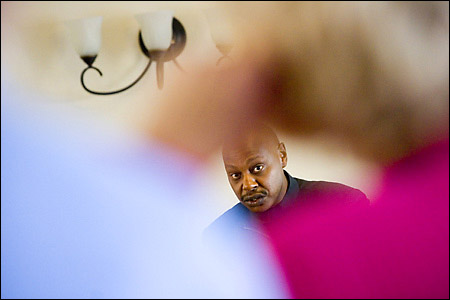Panel discusses documenting atrocity
Conference seeks African human rights responses
Kenyan human rights workers are using past atrocities as a tool to build a sense of national spirit by emphasizing Kenyans’ shared history of suffering and the stake they share today in fighting corruption, eliminating human rights abuses, and assuring equality.
Maina Kiai, chairman of the Kenya National Commission on Human Rights, told a group of about 30 gathered at the Cronkhite Graduate Center that the commission is currently focusing its efforts on illuminating abuses by the British colonial government before the nation’s 1963 independence.

Though there have been human rights abuses under Kenya’s first two presidents, Jomo Kenyatta and Daniel Moi, they pale in comparison to those perpetrated by the British, Kiai said.
In addition, he said, Kenyans today have a strong sense of ethnic and tribal identity, to the extent that any criticism of an individual is often labeled an attack on his or her ethnic group. Building a strong sense of national identity, Kiai said, is a first step toward reforming the current national government, which is rife with corruption and abuses of power.
Kiai spoke during a panel discussion on African innovations in documenting atrocities. Kiai shared the panel with Noel Twagiramungu, a Harvard “scholar at risk” from Rwanda, and Beatrice Mtetwa, a human rights lawyer from Zimbabwe. The panel was moderated by Caroline Elkins, the Hugh K. Foster Associate Professor of African Studies.
The panel was part of a two-day conference that looks to Africa, often the recipient of outside help to deal with human rights abuses, as a place where innovations in handling atrocities and abuses often arise.
Other conference events included speeches, roundtable discussions, and panels on handling refugees and development practices. The conference, “The Future of Human Rights Practice: Innovations in Africa,” was sponsored by the Harvard Committee on African Studies Initiative Working Group on Power, Authority and Governance, Harvard Committee on Human Rights Studies, the Radcliffe Institute for Advanced Study, and the Harvard Humanitarian Initiative.

Mtetwa spoke of using the law to fight abuses by the regime of Zimbabwe President Robert Mugabe. Mtetwa said she is often asked why she bothers taking case after case to the Zimbabwean courts, since the courts are corrupt and influenced by the government. The answer, she said, is for documentation.
With every court case, she said, the courts issue a variety of documents, providing copies to the different parties. Even though the courts can destroy their copies, she said she is preserving a record of abuses that she hopes will be addressed when the Mugabe regime leaves power.
“As a lawyer, I document by ensuring I litigate as much as possible,” Mtetwa said. “Court records provide a very good record for the future.”
In addition, she said, nongovernmental organizations are seeking to document hate speech by the government. One problem faced by those opposing Mugabe’s rule, Mtetwa said, is a lack of independent sources for news. With the radio stations controlled by the government, she said that the government’s assertions that it has support in the countryside is probably due to the lack of impartial news reports reaching people there.
In Rwanda, opposition to the Tutsi-led government is facing similar problems, according to Twagiramungu. Twagiramungu said that the government that came to power after the 1994 genocide has become increasingly authoritarian, cracking down on both news organizations and nongovernmental organizations. The crackdown prompted him and other government opponents to leave the country, while those who remain behind become increasingly silent.
“Who cares about the persons and organizations who have exhibited independence and have disappeared or been arrested, intimidated, and forced into exile?” Twagiramungu asked, saying that it is critical that a safe space for independent organizations is created in Rwanda.
Jacqueline Bhabha, executive director of the Harvard Committee on Human Rights Studies, called the conference “an opportunity for collective reflection.”
“We’re trying to reverse the usual line of discussion where pundits teach Africa to do better and, instead, listen to what our African colleagues have done to advance human rights,” Bhabha said. “We have a very rich canvas, a lot of questions, and, hopefully, some answers.”




